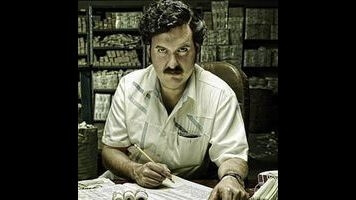Netflix’s drug-war drama Narcos gives summer television a generous bump

Netflix wants the whole world in its hands. Stateside, the Netflix brand has become synonymous with slothful, horizontal weekends, and the streaming behemoth wants to achieve the same level of market dominance worldwide. To that end, the company has taken a shine to original dramas with international appeal, including the tepid epic Marco Polo; Sense8, the Wachowskis’ globe-trotting sci-fi thriller; and Club De Cuervos, the streaming platform’s first Spanish-language drama. Hot on the heels of the last show comes Netflix’s latest drama, Narcos, which chronicles the stranger-than-fiction rise and fall of infamous narcotics distributor Pablo Escobar, who was once to cocaine as Netflix is to documentaries about cocaine.
Narcos has the misfortune of occupying the same period-piece space Netflix fouled up with Marco Polo. And on its face, the show is a similarly facile attempt to woo an international audience by taking an over-examined, inherently violent story and adding pay-cable acidity with sex scenes bathed in golden-hour light. But Narcos is a far more compelling—and, yes, addictive—show than Marco Polo. And miraculously, the show is fun to watch not because it bucks the clichés of a war-on-drugs drama, but because it embraces them. It’s the woefully rare example of by-the-numbers storytelling that serves as a reminder of how those numbers got their sequence in the first place.
Narcos’ charm isn’t entirely clear from its trailer, which stumbles blindfolded into the same Scarface tropes as the fake trailer for Medellin, the comically shoddy Escobar biopic that fueled the third and fourth seasons of Entourage. Worse still is the voice-over from DEA agent Steve Murphy (Boyd Holbrook), whose pursuit of Escobar lends Narcos its based-on-a-true-story bona fides. The device is producer-director José Padilha’s conscious homage to Ray Liotta’s confessional voice-over in Goodfellas, and Holbrook uses the same folksy archness to force the audience’s collusion with the cops rather than the robber barons. That Padilha’s use of the Henry Hill voice-over is a wink doesn’t mitigate the been-there-snorted-that fatigue it brings to the trailer.
But as it turns out, the trailer accurately describe the show while it inaccurately conveys the experience of actually watching the show. Narcos is a delight in its unabridged form, even with the near-constant omniscient narration, which works far better than it should given how much it’s been done in the past. To use such a device isn’t an unusual choice for Padilha, who made a name for himself with the Brazilian drama Elite Squad and its sequel, Elite Squad: The Enemy Within, two similarly narrated and surprisingly fresh takes on the organized crime subgenre. What Padilha’s work lacks in originality, it more than makes up for in enthusiasm.
Wagner Moura, who top-lined and narrated the Elite Squad films, stars as Escobar, who became a billionaire many times over after leading the Medellín drug cartel to control of an estimated 80 percent of the global cocaine market. Escobar became the wealthiest drug dealer in history through a relentless campaign of violence, bribery, and extortion, and Narcos is as frank about his horrific business techniques as it can be without turning into outright torture porn. But between the savvy scripts and Moura’s restrained performance, Escobar’s fangs aren’t always on display. Narcos sees Escobar as he sees himself, as an ingenious businessman blessed with a broader field of vision than his contemporaries.
The pilot finds Escobar, already an accomplished dealer, at the tipping point of his career when he starts thinking beyond Colombia. If cocaine sells at a premium in Colombia, “Imagine how much it’ll sell for in Miami,” he says, with the faux humility of a middle manager. Escobar’s decision to expand into the U.S. sets him on a collision course with Murphy, who, within a few years, graduates from foot chases with the pot-dealing counterculture to desperate firefights with the front lines of a foreign drug cartel. Murphy joins the DEA in taking the battle to Colombia, where he teams up with Javier Peña (Pedro Pascal), a colleague who uses his sexual wiles to gain intelligence on his targets. Though Murphy’s narration is inspired by Goodfellas, Narcos is more akin to The Wire—non-judgmental and equally fascinated with both sides of the cocaine war, as well as the institutional failings that exacerbate it.
Like The Wire, Narcos is consumed with getting it right. Creators Chris Brancato, Eric Newman, and Carlo Bernard strive for period and historical accuracy, and the real-life Murphy and Peña served as consultants to ensure the truth of the story came through. Meanwhile, Padilha frequently drops in chunks of archival footage to reinforce the connection between Moura’s quietly vicious performance and the man who inspired it. There’s a considerable amount of news and archival footage sprinkled throughout Narcos—including the national roll-out of Nancy Reagan’s “Just Say No” campaign—which allows the show to comment on the futility and hypocrisy of America’s war on drugs without forcing the words into the characters’ mouths.
Despite the dark mythology and the density born of condensing such a massive, complex story into a 10-episode season, Narcos is surprisingly effervescent. To call the show “light” would be an overstatement, but like Steven Soderbergh’s more playful work, Narcos is frequently funny and just stylized enough to amplify the entertainment value without minimizing the gravity of the subject matter. It’s an eminently bingeable show even as it makes a strong case for moderate consumption.